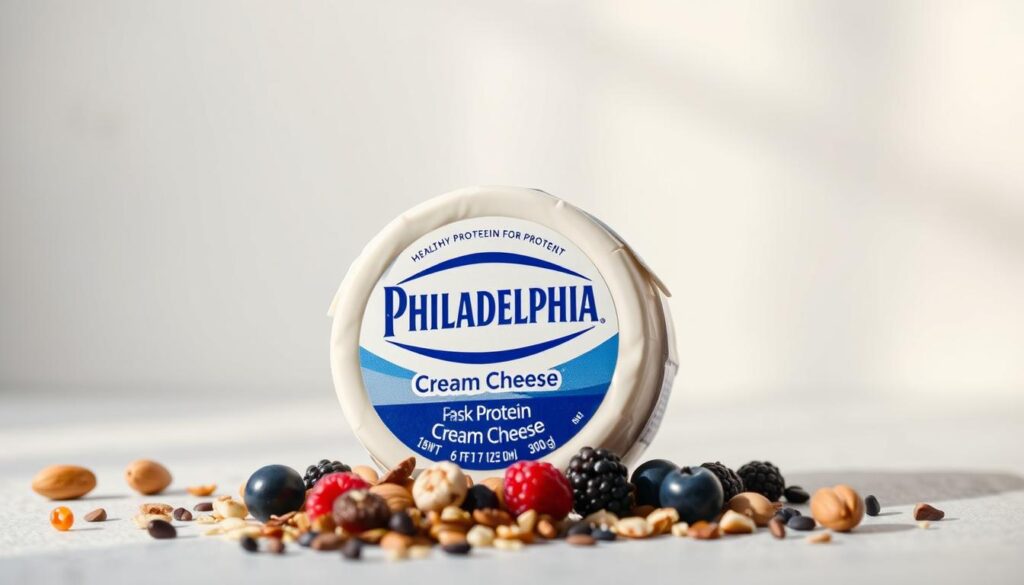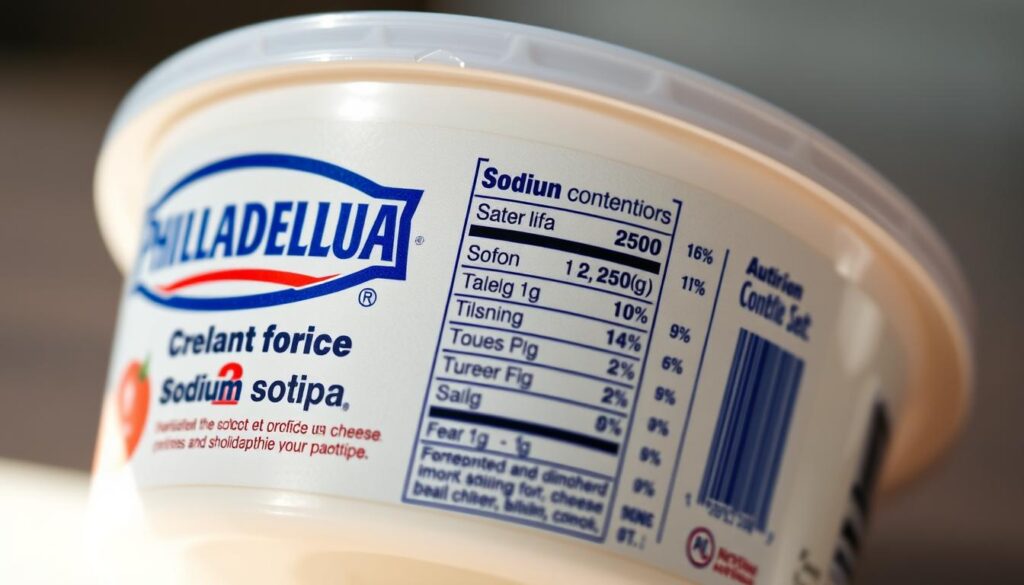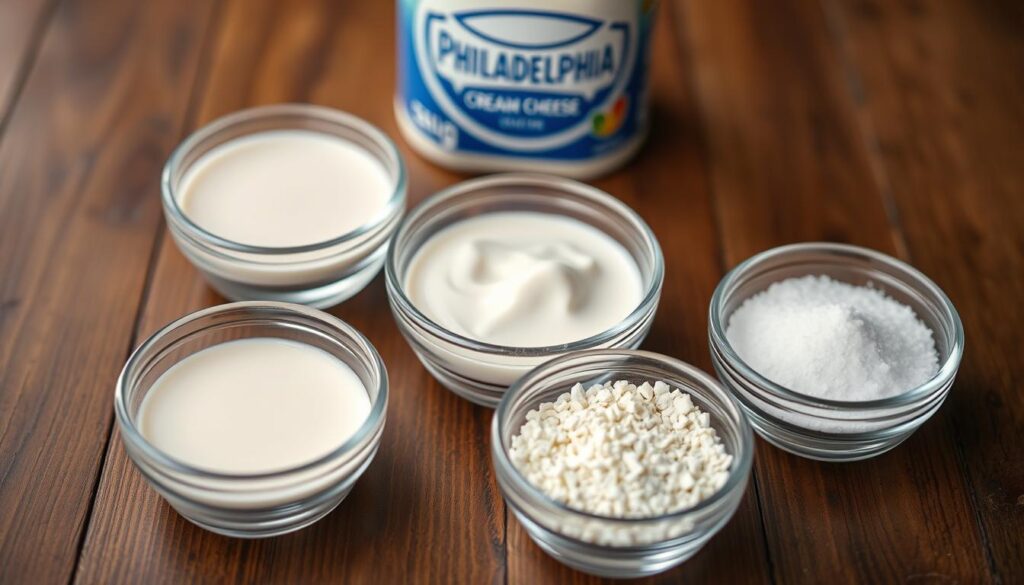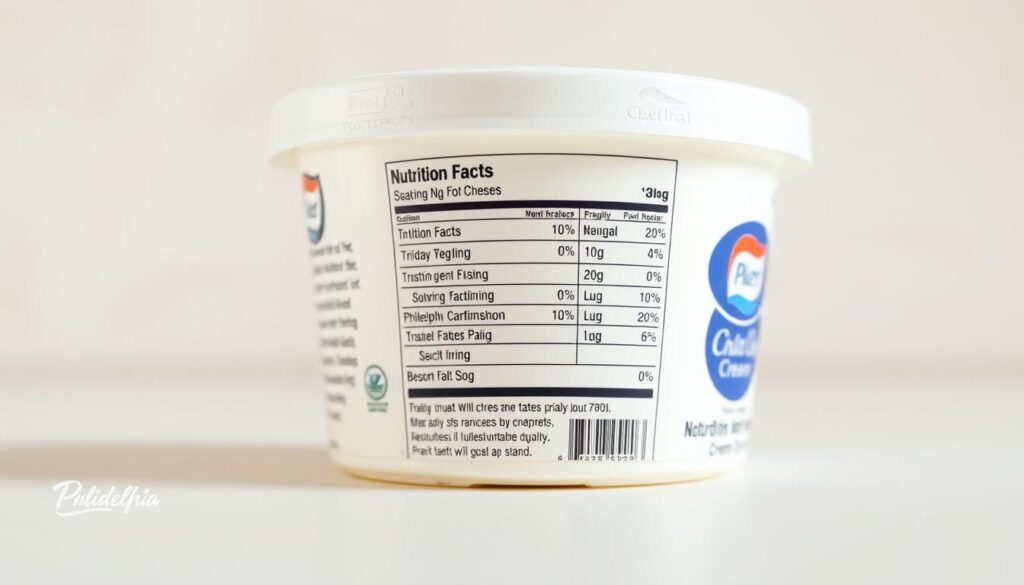Did you know a single tablespoon of Philadelphia Cream Cheese has 50.8 calories and 5g of total fat? Since its creation in the 1880s in New York City, it has become a favorite in many kitchens. Knowing about Philadelphia cream cheese nutrition helps you make better food choices.
Philadelphia Cream Cheese Nutrition , made by Kraft Heinz, has a rich nutritional profile. It suits many dietary needs, from keto diets to those looking for a tasty spread. These nutrition facts offer insights into this beloved product.
The nutrition facts of Philadelphia Cream Cheese show a mix of macronutrients and vitamins. It’s not just tasty; it also has a good balance of fat and protein.
Table of Contents
Overview of Philadelphia Cream Cheese Nutrition
Philadelphia Cream Cheese is a beloved dairy product with a long history. It’s been around for over a century. Kraft Heinz makes it, and it’s a favorite in many American kitchens.
The story of Philadelphia cream cheese started in the 1880s in New York City. It was a new kind of dairy product back then. Its quality and unique making process have kept it popular.
Brand Heritage and Origins
Philadelphia Cream Cheese is more than just a food item. It shows the evolution of American cooking:
- Founded in the late 19th century
- Pioneered smooth, spreadable cream cheese
- Became a household name nationwide
Market Leadership
The brand stays on top by:
- Keeping quality high
- Offering a wide range of products
- Being well-known
Manufacturing Excellence
Philadelphia cream cheese ingredients are chosen and made with care. The making process includes:
| Process Stage | Key Details |
|---|---|
| Milk Selection | Pasteurized cow’s milk |
| Culturing | Specific bacterial cultures |
| Pasteurization | Ensures food safety |
| Packaging | Strict quality control |
Whether on a bagel or in a recipe, Philadelphia Cream Cheese is a reliable choice in kitchens everywhere.
Philadelphia Cream Cheese Nutrition Facts
Understanding the philadelphia cream cheese nutrition label helps you make informed dietary choices. When you pick up a package of Philadelphia Cream Cheese, the nutrition facts provide crucial insights into its nutritional profile.
The nutrition label reveals key details about serving sizes and nutritional content. For a standard serving of one tablespoon (14.5g), you’ll find:
- Calories: 50.8
- Total Fat: 5g
- Sodium: 46.5mg
- Carbohydrates: 0.8g
- Protein: 0.9g
Nutritional density is a key characteristic of Philadelphia Cream Cheese. The product provides essential nutrients while delivering rich, creamy flavor. The philadelphia cream cheese nutrition label breaks down important components like vitamin content:
- Vitamin A: 44.7mcg
- Choline: 3.9mg
- Vitamin E: 0.1mg
Interestingly, the calorie breakdown shows that 87% of calories come from fat, 7% from protein, and 6% from carbohydrates. This makes it a high-fat dairy product that can be part of a balanced diet when consumed in moderation.
Nutrition labels are your roadmap to understanding what you’re eating – knowledge is the first step to making healthy choices.
Keep in mind that while delicious, cream cheese should be enjoyed as part of a balanced diet, paying attention to portion sizes and overall nutritional intake.
Caloric Content and Serving Size
It’s key to know the philadelphia cream cheese calories for a balanced diet. Philadelphia cream cheese comes in various sizes for different diets. Knowing what you eat helps you make better choices.
Standard Serving Information
Tracking philadelphia cream cheese calories starts with knowing the serving sizes. Cream cheese is usually measured in tablespoons or ounces:
- 1 tablespoon (14.5g) contains 50.8 calories
- 1 ounce (approximately 2 tablespoons) provides 100 calories
- Philadelphia Whipped Cream Cheese: 2 tablespoons = 50 calories
Calorie Breakdown
Philadelphia cream cheese has a special nutritional profile:
| Nutrient | Amount per Tablespoon | Percentage of Calories |
|---|---|---|
| Total Fat | 5g | 87% |
| Protein | 0.9g | 7% |
| Carbohydrates | 0.8g | 6% |
Daily Value Percentages
Knowing how Philadelphia cream cheese fits into your daily diet is important:
- Vitamin A: 5% per tablespoon
- Sodium: 46.5mg per tablespoon
- Choline: 3.9mg per tablespoon
Pro tip: Always check the specific variety of cream cheese, as calorie content can vary between regular, whipped, and flavored options.
Macronutrient Profile
Exploring Philadelphia cream cheese nutrition is key to making smart food choices. It has a special mix of nutrients that fits well with many diets.
Philadelphia cream cheese’s macronutrient mix offers some interesting facts:
- Total Fat: 34.44g per 100g
- Protein: 6.15g per 100g
- Carbohydrates: 5.52g per 100g
Fat is the main macronutrient in Philadelphia cream cheese. The fat content is much higher than in other dairy products. Let’s look at the fat types:
| Fat Type | Amount per 100g |
|---|---|
| Saturated Fat | 20g |
| Monounsaturated Fat | 8.907g |
| Polyunsaturated Fat | 1.483g |
For those watching their philadelphia cream cheese nutrition, the protein is only 6%. It’s not a big protein source but adds a creamy touch to foods.
The carbs are 5.52g per 100g, with a bit of sugar at 3.76g. This makes it good for low-carb or keto diets.
Fat Content Analysis
It’s important to know the fat content of Philadelphia cream cheese for good diet choices. This part looks at the fat breakdown in this popular dairy item.
Saturated Fat Content
Philadelphia cream cheese has a lot of saturated fat. In one tablespoon, you get about 5g of fat, all of which is saturated. This is more than some other cream cheese brands.
Unsaturated Fat Breakdown
But, it also has some unsaturated fats:
- Monounsaturated fat: 1.3g per tablespoon
- Polyunsaturated fat: 0.2g per tablespoon
Cholesterol Levels
The fat in Philadelphia cream cheese affects its cholesterol levels. It’s good to know how it might impact your diet.
| Fat Type | Amount per Tablespoon | Percentage of Total Fat |
|---|---|---|
| Total Fat | 5g | 100% |
| Saturated Fat | 5g | 100% |
| Monounsaturated Fat | 1.3g | 26% |
| Polyunsaturated Fat | 0.2g | 4% |
Note: The fat content may vary slightly depending on the specific Philadelphia cream cheese product.
Protein and Calcium Benefits

Philadelphia cream cheese is more than tasty. It’s packed with nutrients like protein and calcium. It may not be high in protein, but it still helps meet your daily needs.
A tablespoon of Philadelphia cream cheese has about 0.9g of protein. This might seem little, but it adds up in recipes or as a spread. Protein is key for:
- Muscle maintenance and repair
- Supporting immune system health
- Helping to maintain stable energy levels
- Promoting tissue growth and regeneration
Calcium is also important in Philadelphia cream cheese. Each tablespoon has about 14.1mg of calcium. Adults aged 19-50 need 1,000 mg of calcium daily. Calcium helps with:
- Strengthening bone density
- Supporting muscle function
- Promoting nerve transmission
- Helping prevent osteoporosis
Remember to use Philadelphia cream cheese in moderation. It’s rich in nutrients but also has saturated fats. Use it as part of a balanced diet to enjoy its benefits while staying healthy.
Carbohydrate and Sugar Content
Knowing about philadelphia cream cheese carbs helps you choose better. It has very few carbs, which is good for those watching their carb intake.
A single tablespoon of Philadelphia cream cheese has 0.8 grams of carbohydrates. This makes it great for low-carb and ketogenic diets.
Net Carbs Breakdown
Net carbs are found by subtracting fiber from total carbs. For Philadelphia cream cheese, it’s easy:
- Total carbohydrates: 0.8g
- Dietary fiber: 0g
- Net carbs: 0.8g
Sugar Types and Sources
Philadelphia cream cheese has very little sugar, about 0.5 grams per tablespoon. These sugars are natural and don’t add much to your sugar intake.
| Cream Cheese Variant | Carbohydrates (per serving) | Sugar Content |
|---|---|---|
| Regular Cream Cheese | 0.8g | 0.5g |
| Philadelphia Brown Sugar Spread | 7g (per 2 tablespoons) | 7g |
People watching their philadelphia cream cheese carbs can add it to their meals. It has a small carb impact.
Sodium Content and Dietary Considerations

It’s important to know how much sodium is in Philadelphia cream cheese. A typical serving has a moderate amount of sodium. This is something to think about if you’re watching your diet.
Sodium is important for your body’s functions. But too much can cause health problems. Knowing how much sodium is in Philadelphia cream cheese helps you understand its place in your diet.
- Recommended daily sodium intake: 2,300 mg
- Sodium content per serving of Philadelphia cream cheese: Approximately 90-100 mg
- Percentage of daily sodium intake per serving: Roughly 4-5%
If you have health issues like high blood pressure, watch your sodium intake. Philadelphia cream cheese has less sodium than many other processed foods.
| Cream Cheese Brand | Sodium Content (mg) | Serving Size |
|---|---|---|
| Philadelphia Original | 90 | 2 tablespoons |
| Clover Sonoma | 85 | 2 tablespoons |
| Treeline | 70 | 2 tablespoons |
To enjoy Philadelphia cream cheese, balance it with other foods. Moderation is key to keep your diet healthy.
Essential Vitamins and Minerals
Exploring Philadelphia cream cheese nutrition reveals a wealth of vitamins and minerals. These nutrients are key to your health, beyond just its creamy taste.
Philadelphia cream cheese is packed with important micronutrients. It has vitamins and minerals that help meet your daily nutritional needs.
- Vitamin A: Supports eye health and immune function
- Vitamin B12: Crucial for red blood cell formation
- Calcium: Promotes bone and dental health
- Phosphorus: Supports bone strength
Here’s a closer look at the vitamin and mineral content:
| Nutrient | Amount per 100g | Percentage of Daily Value |
|---|---|---|
| Calcium | 98 mg | 8% |
| Vitamin A | 400 IU | 8% |
| Vitamin K2 | 8.7 mcg | 7% |
Note: Nutritional values may vary slightly depending on specific product variations.
“Cream cheese can be a tasty way to incorporate additional nutrients into your diet” – Nutrition Experts
While it’s not a superfood, Philadelphia cream cheese is nutritious. It’s all about eating it in moderation as part of a healthy diet.
Ingredient List and Quality Standards
Philadelphia cream cheese ingredients are chosen with care. They make the cheese creamy and rich. Knowing what’s in it helps you make better food choices.

Main Ingredients
The main ingredients in Philadelphia cream cheese are:
- Pasteurized milk and cream
- Cheese culture
- Salt
- Stabilizers
Preservatives and Additives
Kraft Heinz adds certain ingredients to keep the cheese fresh longer. These may include:
- Carob bean gum
- Potassium sorbate
- Sodium phosphate
Quality Control Measures
Philadelphia cream cheese is checked often for quality and safety. The brand follows strict rules, including:
- Regular ingredient testing
- Pasteurization processes
- Continuous production monitoring
“Quality is never an accident; it is always the result of high intention, sincere effort, and skillful execution.” – William A. Foster
This careful selection and production means you always get top-quality cream cheese.
Conclusion
Exploring the nutrition facts of Philadelphia cream cheese shows it’s more than just a tasty spread. Knowing its calorie, fat, and protein content helps you choose better. It’s a versatile ingredient that can be part of a healthy diet if used wisely.
Keeping cream cheese fresh is important. Store it in the fridge at 40°F or below. Use it within one to two weeks after opening. Look out for signs of spoilage like color changes or bad smells. If you notice anything off, throw it away.
Enjoying Philadelphia cream cheese is all about balance. A serving has 99 calories and 10g of fat. Adding it to your meals in moderation helps keep your diet balanced. Try different types like Whipped, Spread, or Brick to find what works best for you.
In conclusion, Philadelphia cream cheese can be a good choice for a balanced diet. Use the tips from this article to add it to your meals thoughtfully. This way, you can enjoy its flavor while keeping your diet healthy.
FAQ
How many calories are in a serving of Philadelphia Cream Cheese?
Is Philadelphia Cream Cheese a good source of protein?
How much fat is in Philadelphia Cream Cheese?
Is Philadelphia Cream Cheese suitable for low-carb diets?
What are the main ingredients in Philadelphia Cream Cheese?
Does Philadelphia Cream Cheese contain any significant vitamins or minerals?
How much sodium is in Philadelphia Cream Cheese?
Are there any low-fat or dairy-free alternatives available?
How should Philadelphia Cream Cheese be stored?
Is Philadelphia Cream Cheese a healthy option?
There are no reviews yet. Be the first one to write one.




